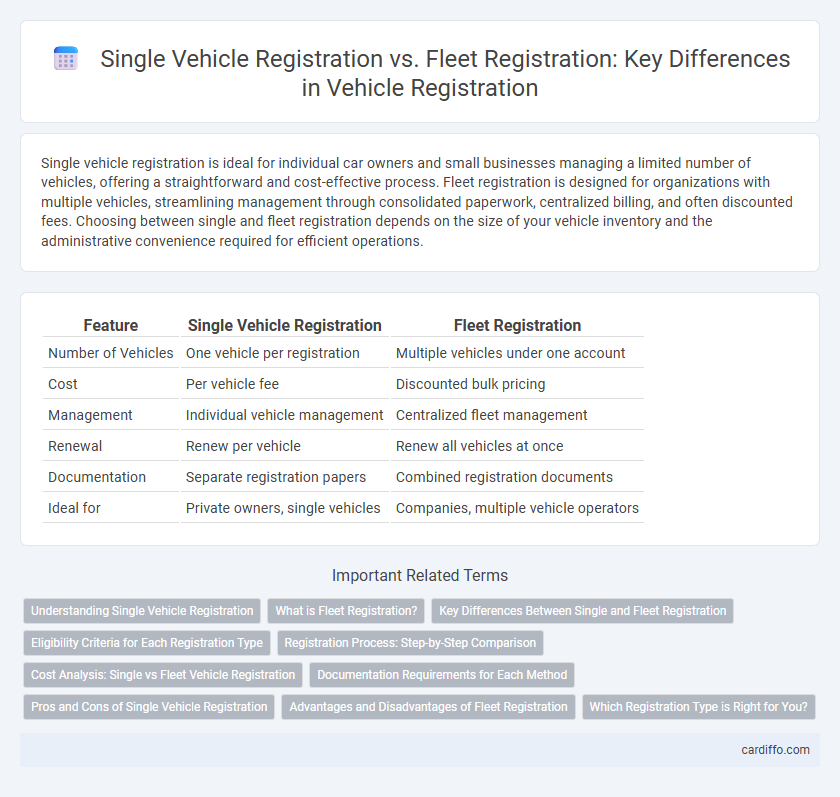Single vehicle registration is ideal for individual car owners and small businesses managing a limited number of vehicles, offering a straightforward and cost-effective process. Fleet registration is designed for organizations with multiple vehicles, streamlining management through consolidated paperwork, centralized billing, and often discounted fees. Choosing between single and fleet registration depends on the size of your vehicle inventory and the administrative convenience required for efficient operations.
Table of Comparison
| Feature | Single Vehicle Registration | Fleet Registration |
|---|---|---|
| Number of Vehicles | One vehicle per registration | Multiple vehicles under one account |
| Cost | Per vehicle fee | Discounted bulk pricing |
| Management | Individual vehicle management | Centralized fleet management |
| Renewal | Renew per vehicle | Renew all vehicles at once |
| Documentation | Separate registration papers | Combined registration documents |
| Ideal for | Private owners, single vehicles | Companies, multiple vehicle operators |
Understanding Single Vehicle Registration
Single Vehicle Registration involves registering one vehicle under a single owner's name, simplifying legal ownership and administrative procedures. This type of registration requires submitting individual vehicle documents, proof of ownership, and payment of applicable fees to the registration authority. It is ideal for personal vehicle owners who do not manage multiple vehicles and need straightforward compliance with local motor vehicle regulations.
What is Fleet Registration?
Fleet registration refers to the process of registering multiple vehicles owned by a single organization or business under one account, streamlining management and compliance. This method simplifies renewal processes, reduces administrative overhead, and often provides cost savings compared to registering each vehicle individually. Businesses with large numbers of cars, trucks, or commercial vehicles benefit from centralized record-keeping and bulk payment options through fleet registration.
Key Differences Between Single and Fleet Registration
Single vehicle registration applies to individual vehicles, requiring separate documentation and fees for each, while fleet registration covers multiple vehicles under one account, simplifying administrative processes and often reducing costs. Fleet registration offers centralized management, including consolidated renewal dates and unified payment options, enhancing compliance and record-keeping efficiency. Single registration is ideal for private owners, whereas fleet registration suits businesses managing numerous vehicles, optimizing scalability and operational logistics.
Eligibility Criteria for Each Registration Type
Single vehicle registration eligibility requires individual ownership or possession of a sole vehicle with valid identification and proof of address. Fleet registration eligibility mandates ownership or management of multiple vehicles, typically five or more, with business credentials, tax information, and a registered fleet operator license. Both registration types necessitate compliance with local motor vehicle department regulations and timely submission of all required documentation.
Registration Process: Step-by-Step Comparison
Single vehicle registration requires submitting individual vehicle details, proof of ownership, insurance documents, and paying registration fees one at a time. Fleet registration streamlines this by allowing multiple vehicles to be registered under one application, often with bulk documentation and consolidated payment options. Both processes typically involve vehicle inspection, verification by the registration authority, and issuance of registration certificates, but fleet registration reduces repetitive administrative steps significantly.
Cost Analysis: Single vs Fleet Vehicle Registration
Single vehicle registration typically incurs higher costs per unit compared to fleet registration, which offers discounted rates for multiple vehicles under one account. Fleet registration minimizes administrative expenses and often provides savings on insurance premiums, maintenance, and renewal fees. Businesses with multiple vehicles benefit from economy of scale, reducing overall expenses significantly through consolidated management and bulk processing advantages.
Documentation Requirements for Each Method
Single vehicle registration requires proof of ownership, valid identification, and the vehicle's title along with insurance documents. Fleet registration involves submitting a master list of vehicles, proof of business ownership, and comprehensive insurance coverage for all vehicles in the fleet. Documentation for fleet registration often includes additional permits and maintenance records to comply with regulatory standards.
Pros and Cons of Single Vehicle Registration
Single vehicle registration offers simplicity and ease, ideal for individual owners needing quick processing and minimal documentation. However, it can become inefficient and costly for businesses with multiple vehicles due to duplicate fees and administrative burdens. Compared to fleet registration, it lacks bulk discount advantages and streamlined management tools essential for larger operations.
Advantages and Disadvantages of Fleet Registration
Fleet registration streamlines the management of multiple vehicles under a single account, reducing administrative tasks and paperwork, which saves time and lowers costs for businesses. It often provides access to bulk discounts, enhanced record-keeping, and simplified renewal processes, improving overall operational efficiency. However, the primary disadvantage is limited flexibility, as individual vehicle control may be restricted, and if one vehicle faces legal or compliance issues, it can impact the entire fleet's registration status.
Which Registration Type is Right for You?
Determining whether single vehicle registration or fleet registration is right for you depends on the number of vehicles and your operational needs. Single vehicle registration suits individual owners or businesses with limited vehicles, offering straightforward documentation and lower upfront costs. Fleet registration benefits companies managing multiple vehicles by streamlining renewals, reducing administrative tasks, and often providing cost savings through bulk processing.
Single Vehicle Registration vs Fleet Registration Infographic

 cardiffo.com
cardiffo.com